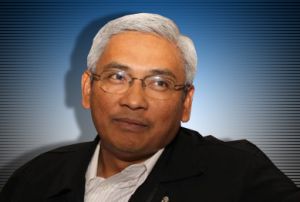Aziz Bari, The Ant Daily
Over the past fortnight, Prime Minister Najib Razak has been staging a fightback and at some points he seems to be having the upper hand.
That is quite natural given his incumbency which means control over most of the critical resources, including the mainstream media and bureaucracy.
But the tipping point appears to be the gathering in Kota Kinabalu last Sunday when Najib reminded Mahathir of what happened in 1987 when the division within Umno brought into the fore Team A and Team B, one that almost cost the latter’s party presidency and premiership. For the record, not too long after that the court declared Umno illegal.
Najib was actually asking Mahathir to return the favour: he sided with Mahathir’s Team A even though initially the son of the second premier Abdul Razak Hussein appeared to be wavering.
Apart from the Sabah gathering, some of Najib’s backers like Salleh Said Keruak also raised the bailout made by Tabung Haji during Mahathir’s days. The GLC was at the time helmed by Mahathir’s brother-in-law Razali Mohamed Ali who was previously the Selangor menteri besar. Apart from this the Perwaja issue has also resurfaced.
Be that as it may, I have pointed out earlier that while most ruling parties in the Westminster world prefer to use party channels rather than slaughtering their leader in public the problem with us in Malaysia is that we do not have the mechanism available elsewhere, particularly in the prototype United Kingdom as well as in Australia.
In the United Kingdom for example when the Conservative Party could not continue with the policies pursued by Prime Minister Margaret Thatcher the MPs staged a revolt and a leadership contest ensued. Thatcher crumbled and John Major, who was formerly the Chancellor of Exchequer (or Minister of Finance), took over as leader and eventually appointed by the Queen as the successor to Thatcher at No 10 Downing Street in late 1990.
Major unexpectedly won the general elections of 1992 and remained in office. But after two years the Conservative MPs were not happy with him and one of his former cabinet colleagues, John Redwood, challenged him for the party leadership. Somehow the challenge was unsuccessful and Major remained as party leader and prime minister until the Conservatives were routed in the subsequent general elections in 1997. Labour’s Tony Blair then became the new British prime minister.
It is to be noted that in the United Kingdom, the party’s chairman is appointed by the party leader who is essentially the leader of the party’s MPs in Parliament. This group of MPs form what is known there as the parliamentary party.
Almost the same thing happened within the Labour Party which ruled Britain between 1997 and 2010. Blair stepped down as party leader in 2007 and hence prime minister. Gordon Brown succeeded him that year.
In Malaysia such a mechanism does not exist and bringing down a premier has to be done via Parliament, namely vote of no confidence. This is just too difficult to happen for various reasons. For one thing it is quite embarrassing to wash dirty linen in public. Secondly, the prime minister – even though he or she may not be popular with party leaders – invariably is in full control of the MPs. A sitting premier may do certain manoeuvring such as a Cabinet reshuffle to strengthen his or her position.
In the past what happened was that the sitting prime ministers voluntarily left office the moment disquiet in the party became louder. This is what one could say about the departure of Tunku Abdul Rahman in 1970 and Hussein Onn in 1981.
The same might be said about Mahathir’s resignation in 2003. In a way it was also the same case with Abdullah Ahmad Badawi in 2009. Najib has made it clear that he would not surrender. Indeed talk of an imminent Cabinet reshuffle has not died down even after his office has denied it.
Even though Malaysia, just like the United Kingdom and Australia, also has a Westminster system, our political culture and system are quite different.
In those countries the party, through their MPs, could force the sitting prime minister to resign. But over here, it is virtually left to the holder. And when the going gets tough the holder may go for a dissolution which will pave the way for fresh elections.
Should this happen, the holder may have the upper hand for it is for the incumbent to select who to contest in the elections.
This is not something that is guaranteed in the United Kingdom for example as candidates for the general elections are being selected openly in a transparent manner by the local party’s club. It is quite bottom-up and not top-bottom like here in Malaysia.
That explains why a week in politics in Britain is a long time. Here, even 22 years as prime minister is quite short.
Dr Abdul Aziz Bari is a former law professor of International Islamic University Malaysia (IIUM) who now teaches at University of Selangor (Unisel).




No comments:
Post a Comment
Note: Only a member of this blog may post a comment.